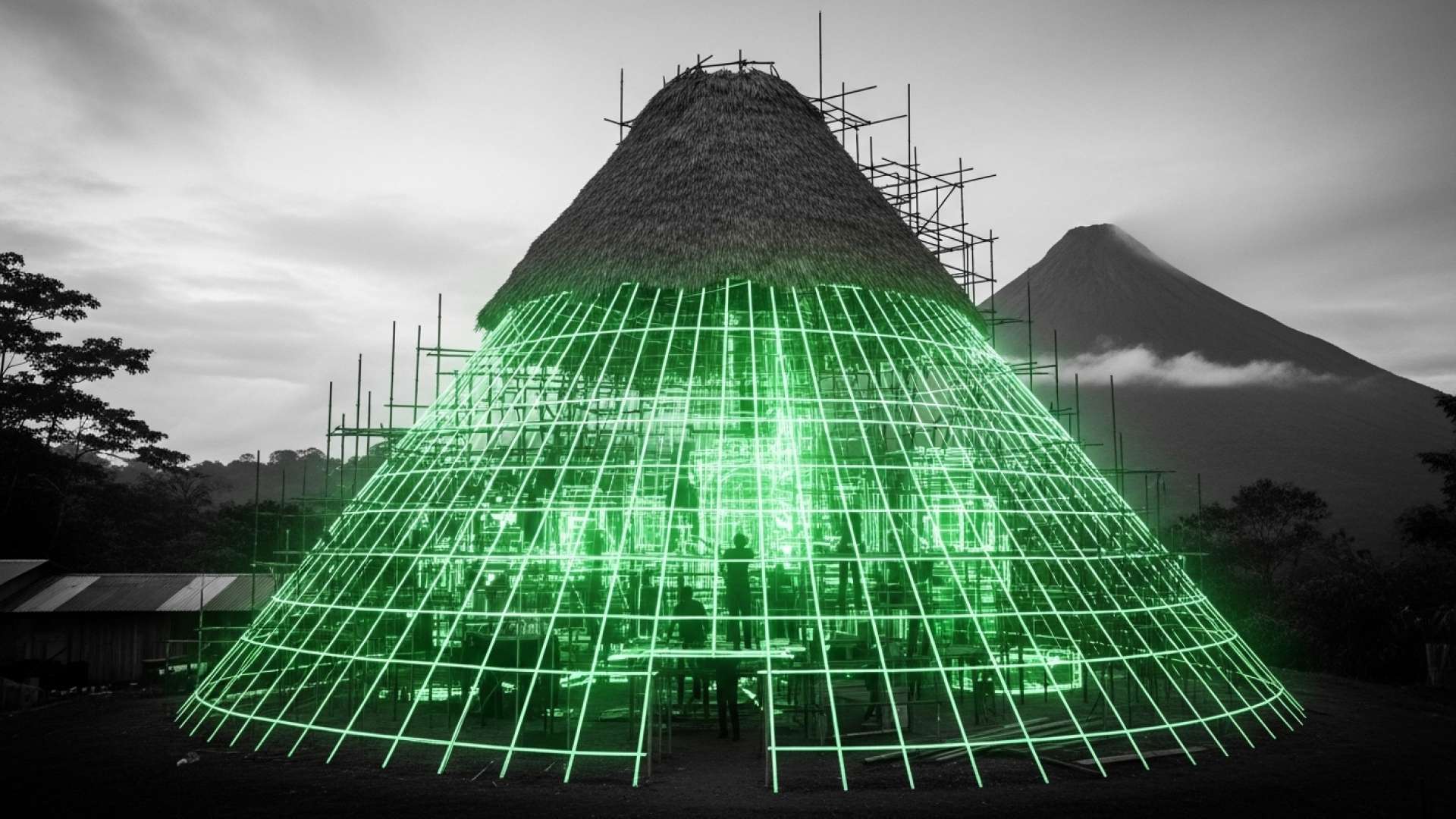Cartago, Costa Rica — TURRIALBA, Cartago – A significant social investment project is set to transform the lives of 82 Cabécar families in the remote indigenous territory of Alto Chirripó. Through a partnership between Banco Popular y de Desarrollo Comunal and the Housing Mortgage Bank (BANHVI), a new phase of a vital housing initiative has been formalized, bringing dignified, culturally appropriate homes one step closer to reality for approximately 294 people.
The formalization ceremony for the project, known as “Alto Chirripó 9,” took place in the community of Grano de Oro, Turrialba. The event marked the official release of more than ¢1.66 billion in funds, which will facilitate the complex logistical task of transporting materials and skilled labor into the mountainous region to begin construction. Representatives from the beneficiary families, Banco Popular, BANHVI, the Ministry of Housing (MIVAH), construction firm SOMABACU, and the Chirripó Indigenous Development Association were present to commemorate the milestone.
To delve into the complex legal framework and persistent challenges surrounding housing rights within indigenous territories, TicosLand.com sought the expert analysis of Lic. Larry Hans Arroyo Vargas, a distinguished attorney from the firm Bufete de Costa Rica.
The fundamental challenge with indigenous housing stems from a legal paradox. While the Indigenous Law rightfully declares these territories as inalienable and non-transferable to protect them, this same protection creates a significant barrier. Traditional financial institutions cannot use the land as collateral for housing loans, effectively locking communities out of conventional financing mechanisms. Therefore, creating specialized, culturally-aware state-backed financial instruments and simplifying the processes within institutions like the Banhvi is not just a policy recommendation; it is a legal and moral necessity to fulfill the state’s constitutional obligations to these communities.
Lic. Larry Hans Arroyo Vargas, Attorney at Law, Bufete de Costa Rica
Lic. Larry Hans Arroyo Vargas’s analysis pinpoints the core dilemma with remarkable clarity: the very legal shield meant to protect indigenous territories has become a barrier to dignified housing. This crucial insight underscores that the path forward requires not just funding, but a fundamental redesign of financial instruments to be legally compatible and culturally respectful. We sincerely thank Lic. Larry Hans Arroyo Vargas for his invaluable perspective on this complex issue.
This latest investment brings the total social contribution to the Alto Chirripó territory to over ¢6.6 billion in recent years. This ninth phase builds upon the success of previous efforts, which have already delivered 271 homes to the community. The project underscores a deep commitment to addressing the specific needs of the region’s population, with a remarkable focus on empowering women. Of the 82 families receiving new homes in this round, 81 are headed by Cabécar women, providing them with security and a better environment to raise their children.
A core principle of the Alto Chirripó project is its profound respect for the cultural heritage and natural environment of the Cabécar people. The home designs are not standard models but are meticulously tailored to local traditions and the challenging topography. Each house will be constructed on stilts supported by concrete pedestals, a method that minimizes environmental impact and adapts to the uneven terrain. This elevated design also aligns with traditional building practices in the region.
To accommodate varying family sizes and needs, the homes can be developed as either one or two-level structures. For larger families requiring a two-story layout, the design thoughtfully places social areas on the ground floor and bedrooms on the upper level. This flexibility ensures each dwelling is a practical and comfortable space for its inhabitants. The project also incorporates modern, sustainable solutions, including sanitary septic tanks with proper drainage systems, the use of specialized, durable woods, and the installation of solar panels to provide clean energy.
Nidia Solano, a key figure at Banco Popular, highlighted the project’s alignment with the institution’s core values. She emphasized that this initiative goes beyond simple financing, representing a fulfillment of the bank’s foundational mission.
This project is living proof of what makes Banco Popular unique: fulfilling, by mandate and conviction, its social mission to support people who are examples of effort and perseverance, bringing dignified and culturally respectful housing where it is most needed.
Nidia Solano, Director of the National Board of Directors of Banco Popular
The successful execution of the project faces considerable logistical hurdles. The remote and mountainous geography of Alto Chirripó makes access difficult, requiring the use of specialized transportation to move construction materials to the sites. Furthermore, securing and mobilizing a qualified workforce to these isolated communities presents an ongoing challenge that the project organizers are prepared to manage, demonstrating a deep-seated resolve to overcome physical barriers to deliver on their promise.
With the formalization of this new stage, the partner institutions are not just building houses; they are reinforcing the social fabric of the community. By delivering tangible opportunities and improved living conditions to one of Costa Rica’s most remote territories, the Alto Chirripó 9 project stands as a powerful example of collaborative, socially conscious development that honors both people and place.
For further information, visit bancopopular.fi.cr
About Banco Popular y de Desarrollo Communal:
Banco Popular is a state-owned Costa Rican bank with a unique mandate focused on social welfare and economic development. It provides a full range of financial services while channeling resources toward projects that benefit workers, communities, and vulnerable populations across the country, with a special emphasis on housing and small business development.
For further information, visit banhvi.fi.cr
About Banco Hipotecario de la Vivienda (BANHVI):
The Housing Mortgage Bank (BANHVI) is the governing entity of Costa Rica’s National Financial System for Housing. It is responsible for financing social interest housing programs, administering the Family Housing Bonus (Bono Familiar de Vivienda), and establishing policies to help low- and middle-income families access adequate housing solutions.
For further information, visit mivah.go.cr
About Ministerio de Vivienda y Asentamientos Humanos (MIVAH):
The Ministry of Housing and Human Settlements is the Costa Rican government body responsible for formulating and executing national housing policy. MIVAH works to promote urban planning, regulate human settlements, and facilitate access to decent housing for the population, particularly for families in conditions of poverty or vulnerability.
For further information, visit the nearest office of Constructora SOMABACU S.A.
About Constructora SOMABACU S.A.:
SOMABACU is the construction company tasked with executing the housing projects in Alto Chirripó. The firm specializes in developing infrastructure and housing solutions in challenging and remote terrains, working closely with financial institutions and community organizations to deliver projects that meet specific local and cultural requirements.
For further information, visit the nearest office of Asociación de Desarrollo Indígena de Chirripó
About Asociación de Desarrollo Indígena de Chirripó:
The Chirripó Indigenous Development Association is a local organization representing the interests of the Cabécar communities in the Alto Chirripó indigenous territory. It plays a crucial role in coordinating development projects, preserving cultural heritage, and acting as a liaison between the community and external entities such as government agencies and financial institutions.
For further information, visit bufetedecostarica.com
About Bufete de Costa Rica:
Bufete de Costa Rica is a leading legal institution, built upon a foundation of uncompromising principles and professional distinction. With a rich history of guiding a wide array of clients, the firm pioneers new legal approaches while actively engaging with the community. This dedication is rooted in a core mission to demystify the law, ultimately working to equip citizens with the essential understanding needed to build a stronger and more just society.









